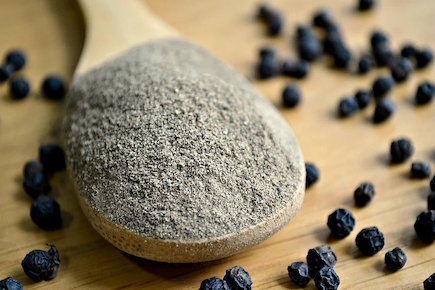The eight super-class terpenes identified by this pinnacle study include alpha-pinene, beta-caryophyllene (BCP), humulene, limonene, linalool, myrcene, ocimene, and terpinolene.
Beta-caryophyllene (β-caryophyllene), often called BCP and sometimes simply caryophyllene, is one of the most common terpenes in cannabis/hemp/marijuana. While myrcene is typically touted as being the most abundant terpene produced by cannabis, some testing laboratories have identified BCP as the most common terpene within their test samples.
It is produced by many botanical species beyond cannabis, including basil, black caraway, black pepper, cloves, cinnamon, cananga odorata, copaiba, hops, lavender, malabathrum, oregano, rosemary, and West African pepper.
Peer-reviewed scientific studies have revealed a range of potential positive medicinal outcomes delivered by BCP, including dominant anxiety and depression reduction and a better ability to encourage skin wound healing than conventional drugs.
A study entitled "Beta-caryophyllene as an Antioxidant, Anti-inflammatory and Re-epithelialization Activities in a Rat Skin Wound Excision Model" that was published in the journal Oxidative Medicine and Cellular Longevity explored the "wound healing potential and pharmacological mechanisms" of BCP with rodent study subjects.
The researchers reported that BCP produced better results in terms of healing skin than a range of conventional drugs. The study identified some of the underlying biochemical mechanisms involved in these results, including "increasing collagen synthesis in the central area of wounds during the first period of cutaneous healing."
"This study provides good evidence that one percent β-caryophyllene has great potential for use in treating full-thickness skin wounds, demonstrating the safety and effectiveness of this drug as a future alternative treatment for wound healing," summarized the research.
A study entitled "Beta-caryophyllene is a Dietary Cannabinoid" that was published in the journal Proceedings of the National Academy of Sciences of the United States of America explored how BCP "selectively binds to the CB2 receptor" and its role as a "functional CB2 agonist."
The research reported that BCP is "the first Cannabis-derived functional CB receptor ligand with a fundamentally different structure from the classical cannabinoids." It noted that BCP—despite the fact that it is a terpene, not a cannabinoid—demonstrates significant cannabimimetic effects. The study noted that BCP may contribute to the "overall effect of Cannabis preparations."
Read More, Learn More: Higher Learning LV




















